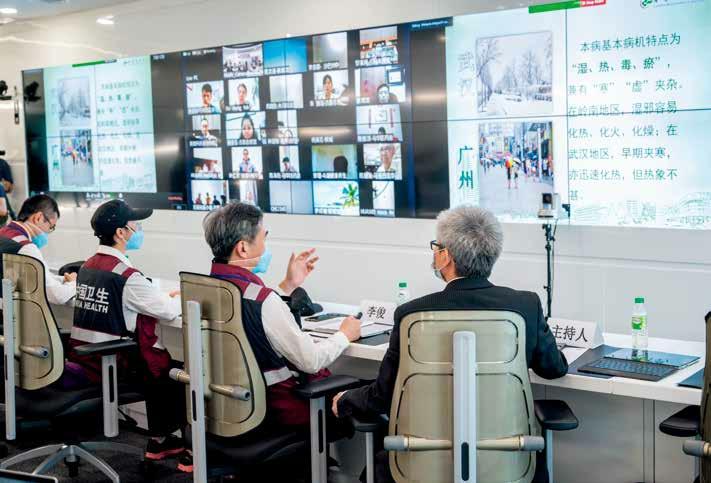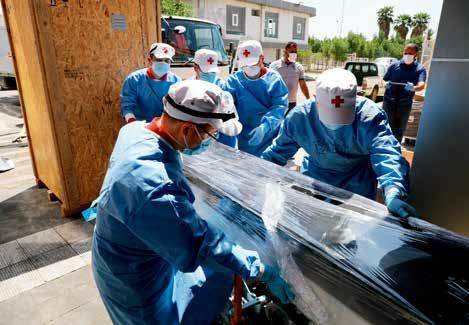Global Crisis Demands Global Response
2020-06-29byZhangGuihong
by Zhang Guihong
The COVID-19 pandemic has spread to more than 200 countries within three months. Confirmed infections and deaths continue to increase with each passing day.
The disease has not only swept through almost every country in the world but also the United Nations(UN) and other international organizations. On March 12, 2020, a delegate from the Permanent Mission of the Philippines to the UN tested positive for the novel coronavirus, the first confirmed case at the UN headquarters in New York. At the time of writing, a total of more than 200 cases of COVID-19 including three deaths had been reported within the UN system. UN Secretary-General António Guterres issued a work-at-home order for all non-essential personnel from March 16 to April 12. Telecommuting arrangements at the UN headquarters, the first in its 75-year history, have been extended through May 31.
As proclaimed by Guterres, the pandemic is the most challenging crisis the world has faced since the end of World War II. A global crisis demands a global response. As the most inclusive, representative, and authoritative international organization, the UN has stepped into a leadership role in organizing global cooperation to fight the pandemic. Since the COVID-19 outbreak, the UN has monitored the development of the pandemic, and it began taking swift global action when the World Health Organization (WHO) declared a global pandemic on March 12. All international organizations have been mobilized to facilitate joint efforts to address the unprecedented challenge. The UN General Assembly adopted a resolution calling for intensified international cooperation to contain, mitigate and defeat the pandemic. UN Secretary-General Guterres launched a series of initiatives including a global humanitarian response plan to help the most vulnerable countries and groups, an appeal for a global ceasefire, an appeal to prevent and redress violence against women during the epidemic, and a new communications response initiative to distribute facts and science on the internet.
With a little hindsight, at least two lessons can be learned already. The first involves the consequences of failing to take preventative measures after early warnings. The epidemic could have been contained entirely before it spread in Europe and America. Unfortunately, many countries missed the “window of opportunity.” The other lesson relates to the lack of unity and cooperation. Since the WHO declared the epidemic a “Public Health Emergency of International Concern” at the end of January, most countries moved unilaterally, if at all. Senior officials in some countries insist on blaming others to pander to domestic politics. This is why we lack real global solutions.

Now is the critical time to seize the second “window of opportunity” to prevent the spread of the pandemic to the most vulnerable countries and people in the developing world. The UN and the WHO need to take bold and meaningful global action to fight the pandemic. Five key words are guiding UN and WHO global action on the pandemic in the coming days:
Humanitarianism. Humanitarianism is the key to global consensus. The virus knows no border, ideology or race. It threatens the health and safety of all people. The pandemic has caused and will continue to cause illness, death, poverty, homelessness, unemployment and more social problems, making it a serious human crisis rather than an issue of national security. Humanitarian aid can help the vulnerable overcome difficulties and minimize troubles. Humanitarian cooperation, regardless of national interests, ideology or political system, is necessary and more urgent than ever before. A humanitarian spirit respecting life should be both the bottom line and the highest standard of global consensus. The UN needs to highlight the importance of humanitarianism in global cooperation on the pandemic.
Unity. The virus is the common enemy for every country and every person. If any country has confirmed cases, the pandemic is not over. Helping others benefits the giver. Unity is a prerequisite for any substantial international cooperation. The weak international cooperation on epidemic response can be attributed to lack of mutual trust among member states, particularly major countries. For this reason, UN SecretaryGeneral António Guterres has repeatedly called for unity, and the UN General Assembly adopted a resolution titled “Global solidarity to fight the coronavirus disease 2019 (COVID-19)” in early April. The UN has the unique responsibility of uniting the international community to produce joint efforts to fight the virus.
Science. We will use science, not politics, to defeat the virus. Science and technology are the most powerful weapons to overcome a health crisis. As the specialized agency in charge of public health affairs within the UN system, the role of WHO in the fight against COVID-19 is unique, central, and irreplaceable. Accelerating scientific research is the only way to pinpoint the origin of the virus and develop vaccines against COVID-19. Trust in science is the vaccine for another epidemic—a dangerous wave of misinformation ranging from conspiracy theories to brazen falsehoods, harmful medical advice, and bigotry. Battling the virus requires not only natural science but also humanities and social science. The WHO is responsible for disseminating facts and science to counter the growing scourge of misinformation.
Non-traditional. Like climate change and terrorism, COVID-19 is a typical non-traditional threat to international society. In contrast with traditional security issues, non-traditional challenges demand innovative responses. In this case, every state and non-state actor is part of the global solution to the pandemic. Staying home and practicing social distancing are two of the easiest and most effective ways of minimizing the spread of the virus. Such strategies require cooperation and compliance from every citizen. Coordination and cooperation among international organizations need to be strengthened to mobilize global and regional resources to tackle the non-traditional security threat. The UN along with the WHO can play a lead role in this regard.
Symbiosis. The pandemic is predicted to end someday. However, the virus may not disappear and could persist forever in asymptomatic humans. The virus is a member of the natural world. The concept of “herd immunity” proposed by top scientists in the UK and Germany reflects part of symbiosis. The core idea is “live and let live.” The concept of symbiosis is closely related to the UN75 initiative—the largest and most inclusive conversation on the worlds future, launched on January 1, 2020. It also has unique value for global health governance led by the WHO in the post COVID-19 era. The concept of symbiosis is consistent with the idea of “a community with a shared future for humanity.” It may become more easily accepted worldwide because it says so much about the human-nature relationship in just one word.